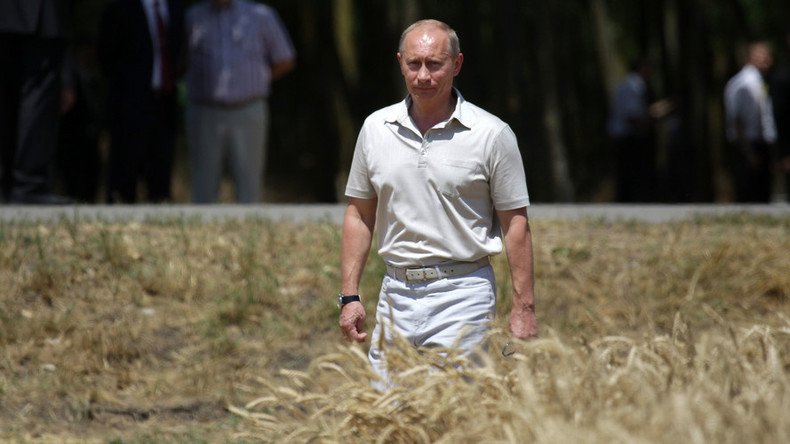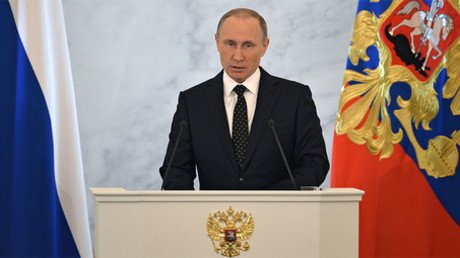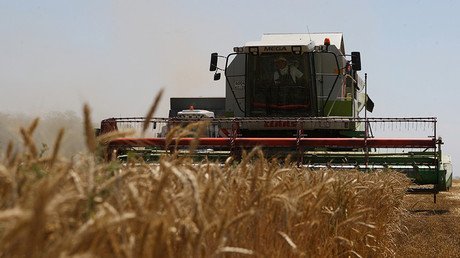Putin wants Russia to become world's organic food superpower but first hopes to clip Turkey's wings

Vladimir Putin's annual parliamentary address, roughly equivalent to America's ‘State of the Union,’ was heavy on talk of fighting terror. However, his proposals for organic agriculture reform may prove a lasting legacy.
How quickly times change. In late September, Recep Tayyip Erdogan ventured to Moscow for the inauguration of the city’s new Grand Mosque. Said to have cost $170 million, it can accommodate 10,000 people and is one of Europe’s biggest. Many locals view the Grand Mosque as a sign of Russian tolerance. Proof that Islam can be successfully integrated into a largely Christian society. Erdogan was well received in Moscow. Back then Turkey was viewed as a friendly country.
While Russia remains mostly impervious to sectarianism, it is almost uniformly hostile to Erdogan since Turkey shot down a Russian plane last week. Right now, the sight of Turkey’s President in Moscow would be about as welcome as a snow flurry in July. Ankara’s days as trusted partner of the Kremlin have abruptly ended.
Most Russia pundits in the Western press suggested that Putin’s response to Turkish aggression would be heavy on verbiage and light on action. That hypothesis was way off the mark. This dispute is evidently personal for the Russian President. Putin feels that Erdogan’s government stabbed Russia in the back. Thus, the Kremlin will have its vengeance.
Speaking at Thursday’s annual address to Russia’s parliament, Putin stated: “If someone thinks they can commit war crimes, kill our people and get away with it, suffering nothing but a ban on tomato imports, as well as a few restrictions in construction or other industries, they’re delusional.”
In other words, the Kremlin is preparing a punishment of some sort for Turkey. Whether that means waiting in the long grass or striking swiftly is unclear. There are numerous options open to Moscow. Putin’s government could decide to further assist Kurdish forces in the Middle East, but that risks alienating Baghdad. Revenge could mean further strikes against Ankara’s favored ‘Turkmen’ insurgents in Northern Syria. Another option is to prove, beyond any doubt, that Erdogan’s associates are working hand-in-glove with ISIS and profiting from terrorism. Nevertheless, the most proportionate, if geopolitically risky, response would probably be to shoot down any Turkish jets that stray into Syrian airspace. To that end, Russia has deployed the latest anti-aircraft technology, effectively imposing a no-fly zone.
The danger of a unipolar world
Putin’s address opened with mention of “fighting international terrorism”. He proceeded to remind listeners that Russia had endured its effects first-hand over the years. The President outlined that the present Syria campaign was “a fight for freedom, truth and justice”.
A frequent theme of numerous Putin speeches, going back to his famous 2007 remarks in Munich has been concern at an American desire to control the planet unilaterally. Back then he declared: “…What is a unipolar world? However one might embellish this term, at the end of the day it refers to one type of situation, namely one centre of authority, one centre of force, one centre of decision-making. It is a world in which there is one master, one sovereign. And at the end of the day this is pernicious not only for all those within this system, but also for the sovereign itself because it destroys itself from within.”
That theme hasn’t changed. “Iraq, Libya and Syria have turned into zones of chaos and anarchy which threaten the whole world,” he said on Thursday. “And, of course, we know why this happened. We know who wanted to change inconvenient regimes, and crudely impose their rules. And what was the result? They made a mess, ruined the states, turned different peoples against each other and then, as we say in Russia, washed their hands of the places, opening the road for radicals, extremists and terrorists.”
Tons and tons of newspaper articles, intelligence reports, academic texts and journals are published each year in the US focused on what Putin wants. There’s a cottage industry online which debates it hourly, let alone daily or weekly. Dozens of academics and journalists have made a living out of ‘Putinology’. However, it’s pretty clear from the man’s words what he wants and has wanted for at least eight years. Putin is pushing for a multipolar world. One where the United Nations, rather than Washington, dictates the rules of the game.
Speaking Thursday, Putin called again for a “broad coalition” to fight ISIS. Of course, while France appears to favor this idea, Washington has furiously worked to derail it. Such an outcome would diminish the total control America has enjoyed over Europe for the past 25 years. Hence, it’s unfathomable to the White House, unless they are forced to acquiesce.
A food revolution
On the domestic front, Putin delivered a business and reform-orientated speech. He conceded that an “army of inspectors” (a post-Soviet hangover) interferes with business in Russia and promised change. He also highlighted Russia’s improving demographic situation. “More people are now having second and third children. This means they believe in the future of Russia,” he said. Given the shocking state of the Russian birth-rate in the 1990’s, this recovery is a very big deal. Government policy has been successful in that area and Putin extended current financial and social incentives for a further two years.
However, for this writer, the most notable element of Putin’s speech was when he turned his attention to agriculture. Readers who have flown over Russia will have noticed the almost complete absence of intensive farming when compared with Europe or North America. The only real exception here is the southern Krasnodar region which benefits from a very benign climate. There is little doubt that if Russian got its act together in this regard, it could probably feed the whole planet.
Problems in Russian agriculture have festered throughout history. Most infamously, former Soviet ruler Nikita Khrushchev, born to a farming family, fancied himself as something of an agricultural expert, but his disastrous ‘reforms’, allied to a terrible drought, almost led to a famine as recently as 1963. The ‘Virgin Lands’ campaign of the 1950’s was also spectacularly unsuccessful.
In the 21st century, Russian food production has improved. Now, Putin is proposing a major focus on the area. “By 2020, Russia must provide itself with all food,” he implored. "We need to cultivate the millions of acres now idle.” The President suggested confiscating unused farmland and its sale to new owners willing to till it.
An organic dawn
As the Kremlin has rejected the idea of GMO food production, now a mainstay of American agriculture, Russia could become the world’s principal supplier of high-quality organic food. Meaning there is potential to dominate the “high-end” market in both the West and in other wealthy countries - like China and the Middle Eastern states.
"We are not only able to feed ourselves taking into account our lands, water resources – Russia is able to become the largest world supplier of healthy, ecologically clean and high-quality food which the Western producers have long lost, especially given the fact that demand for such products in the world market is steadily growing," said Putin. Of course, a major problem here is insufficient labor. However, with some European and Asian countries creaking economically, it mightn’t be so difficult to attract agriculture workers.
The Presidents annual address is always pivotal in the Russian political calendar. This year’s was somewhat overshadowed by tensions with Turkey and Moscow’s anti-ISIS campaign. Thus, the crucial emphasis on farming seems to have been ignored by the world’s media. With gas and oil prices choked, Russia needs to diversify its economy. Agriculture is a logical trump card. At this stage, Russia has everything to gain.
The statements, views and opinions expressed in this column are solely those of the author and do not necessarily represent those of RT.















